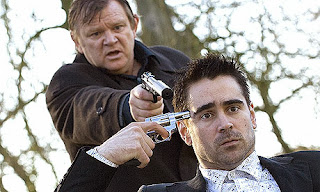 I first came across Martin McDonough when I gave a cursory glance at The Pillowman, a play suggested to me by a friend. The Pillowman is somewhat of a hybrid between science fiction and fairytale, following an author in a totalitarian state who is accused of murder after the fairytales he writes severely coincide with recent child murders. I fell in the love with the play only a few pages in, and McDonough was quickly rocketed to the very apex of my favorite writers list. I loved the style of his dark comedy, something that seems pervasive through all of his works that I've come across. I think perhaps what I loved most about this play in particular was the application of the slow reveal. The play begins with a plethora of ambiguity; you're simply thrust into an interrogation room, and this ultimately leads to a stronger climax.
I first came across Martin McDonough when I gave a cursory glance at The Pillowman, a play suggested to me by a friend. The Pillowman is somewhat of a hybrid between science fiction and fairytale, following an author in a totalitarian state who is accused of murder after the fairytales he writes severely coincide with recent child murders. I fell in the love with the play only a few pages in, and McDonough was quickly rocketed to the very apex of my favorite writers list. I loved the style of his dark comedy, something that seems pervasive through all of his works that I've come across. I think perhaps what I loved most about this play in particular was the application of the slow reveal. The play begins with a plethora of ambiguity; you're simply thrust into an interrogation room, and this ultimately leads to a stronger climax.It wasn't until another friend recommended "In Bruges" that I realized that McDonough had made the leap from the stage to the big screen. I had been desperately trying to watch this film, but unfortunately I couldn't find a copy anywhere. Then, finally, as if some ethereal being wanted to grant the wishes of some eighteen year-old cinephile, "In Bruges" appeared on Netflix. To put it quite simply, the film, at the very least, met all the expectations I held prior to actually watching.
The film follows two hit men, Ray (Colin Farrell) and Ken (Brendan Gleeson) who are ordered to hide out in Bruges, a belgian town, after a particularly messy hit in London. It is through their interactions with tourists, locals, and a film crew, that we learn about the two hit men, and how killing people for a living has influenced their views on life and death.
Martin McDonough, no doubt the king of dark comedy, definitely strikes a balance between wit and heart in this film. The film is perhaps, on the surface, most recognizable for it's biting wit, deriving mostly from the bluntness and differing attitudes of the two main characters. The humor in this movie is only augmented by the great situational comedy, like Ray karate chopping a racist little person after doing cocaine with belgian prostitutes.
What really sets the writing apart in this film though is how easily it flows from scenes of extreme humor, to extremely dark and sensitive scenes.
*SPOILER ALERT*
Midway through the film it's revealed that the reason Ray and Ken are hiding in Bruges is because Ray accidentally shot a young boy on his last hit. This totally changes the mood of the film, as you understand the character and his motivations for how he acts in Bruges. I really appreciate the fact that this reveal comes later on in the film, somewhat reminiscent of The Pillowman, as it would not have the same effect as it would if it were just explicitly stated at the beginning.
I was mildly underwhelmed by the cinematography in the film. It was not bad, but it wasn't spectacular in any way. There were a few scenes that were so beautifully composed, that they unfortunately clashed with the rest of the film. That is mildly jarring for me, as I can see how well done it could've been across the board. However, as with all cinematography, you have to evaluate whose point of view the shot derives from, so I'd have to give the film a second glance to see if I didn't give it enough credit. Overall, it was still decently shot, just not great.
I highly encourage everyone to watch a Martin McDonough film or read one of his plays. He's a masterful storyteller that's worth anyone's time.


No comments:
Post a Comment